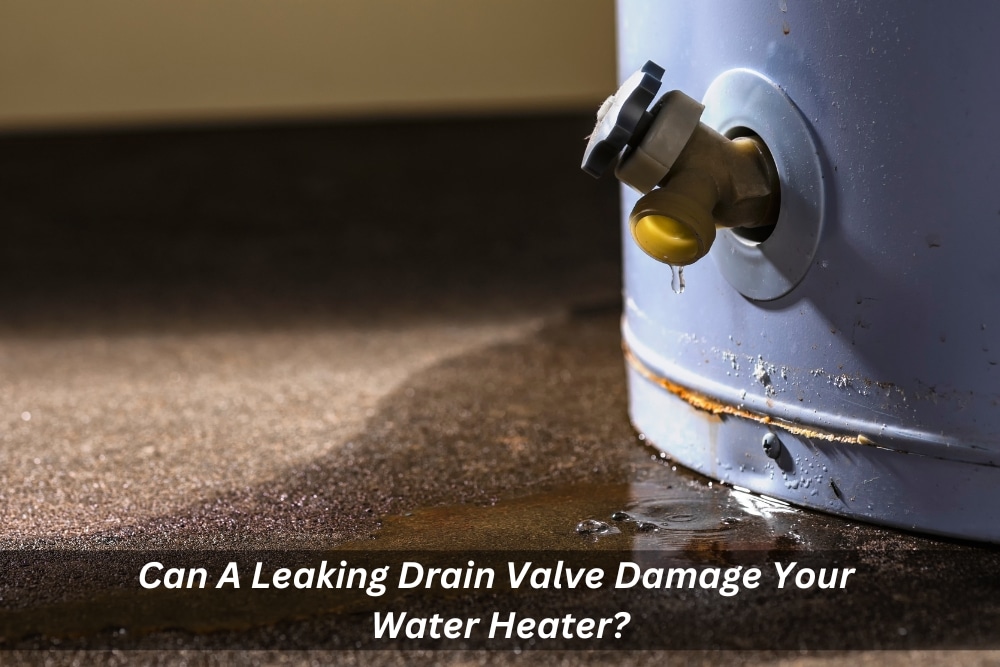If you’ve ever had the unfortunate experience of discovering a leaking drain valve on your water heater, you may be wondering about the potential consequences. A leaking drain valve can indeed lead to problems with your water heater if left untreated. In this article, we will explore what a water heater drain valve is, why it might be leaking, and how it can damage your water heater. We’ll also provide guidance on fixing the issue, knowing when to call a hot water system repair specialist, and preventive measures to avoid future leaks.
What is a water heater drain valve?
Before we delve into the implications of a leaking drain valve, let’s start with the basics: understanding what a water heater drain valve is and its purpose. The drain valve is a small, often brass or plastic valve located at the base of your water heater tank. Basically, its primary function is to allow for the draining of water from the tank for maintenance purposes, such as flushing out sediment buildup or replacing the heating element.
Why is your water heater leaking at the drain valve?
Now that you know what a water heater drain valve is, you might be wondering why it’s leaking in the first place. Several factors can contribute to this issue:
- Corrosion: Over time, the drain valve may become corroded, especially if it’s made of metal. Corrosion weakens the valve, causing it to develop small leaks.
- Sediment buildup: Sediment can accumulate inside the tank, and if it reaches the drain valve, it can obstruct its proper sealing. Additionally, this obstruction can lead to leaks.
- Excessive pressure: If there’s a sudden increase in water pressure in your plumbing system, it can put stress on the drain valve, leading to leaks.
- Age: Like all components of your water heater, the drain valve has a limited lifespan. As it ages, it becomes more susceptible to leaks.
Could a leaky drain valve on your water heater harm the unit itself?
The short answer is yes, a leaking drain valve can potentially damage your water heater. Here’s how:
- Energy wastage: When the drain valve is leaking, your water heater will continuously lose hot water, causing it to work harder to maintain the desired temperature. Furthermore, this increased workload can result in higher energy bills.
- Corrosion and rust: The leaking water can lead to corrosion and rust on the bottom of your water heater tank. Moreover, this corrosion weakens the tank’s integrity, making it more prone to developing cracks and leaks.
- Flood risk: If the leak worsens and goes unnoticed for an extended period, it can cause significant water damage to the surrounding area. This not only leads to costly repairs but also poses safety hazards.
- Reduced lifespan: The constant strain on your water heater caused by a leaking drain valve can significantly shorten its lifespan. This means you may need to replace your water heater sooner than expected.
How can you repair a leaking water heater drain valve?
Addressing a leaking drain valve promptly is essential to prevent further damage to your water heater. Here are the steps to fix it:
- Turn off the power: If you have an electric water heater, switch off the power at the circuit breaker.
- Shut off the water supply: Close the cold water inlet valve leading to your water heater.
- Drain the tank: Attach a garden hose to the drain valve and open it to release any remaining water from the tank. Be cautious as the water will be hot.
- Remove the old drain valve: Using a wrench, carefully remove the old drain valve from the tank. If the valve is stuck due to corrosion, you may need to apply penetrating oil and wait for it to loosen.
- Install a new drain valve: Replace the old valve with a new one, ensuring it’s securely tightened.
- Tighten and seal: Use thread seal tape or plumber’s tape to create a tight seal. This will prevent future leaks.
- Turn on the water supply: Reopen the cold water inlet valve to allow water to fill the tank.
- Restore power: For electric water heaters, switch the power back on at the circuit breaker.
- Check for leaks: Inspect the new drain valve for any leaks. If there are no leaks, you’ve successfully fixed the issue.
When should you contact a hot water system repair specialist?
While fixing a leaking drain valve is a manageable task for some, there are situations where it’s best to seek the expertise of a hot water system repair specialist:
- Severe corrosion: If the drain valve is severely corroded and difficult to remove, it’s advisable to have a professional handle the replacement to avoid further damage.
- Leaks persist: If you’ve attempted to fix the drain valve, but the leaks persist or worsen, it indicates a more complex issue that requires professional attention.
- Age of the water heater: If your water heater is nearing the end of its expected lifespan, it may be more cost-effective to consult a specialist who can assess whether it’s time for a replacement.
How can you prevent leaks in your water heater’s drain valve?
Preventing drain valve leaks and maintaining your water heater can extend its lifespan and save you from unnecessary repairs. Here are some preventive measures:
- Regular maintenance: Periodically flush your water heater to remove sediment buildup. This will reduce the chances of sediment clogging the drain valve.
- Anode rod replacement: Replace the anode rod in your water heater as recommended by the manufacturer. This sacrificial rod helps prevent corrosion inside the tank.
- Pressure regulation: Install a pressure regulator on your plumbing system to prevent sudden increases in water pressure, which can stress the drain valve and other components.
- Professional inspections: Schedule annual or bi-annual inspections by a qualified technician to check for potential issues and perform necessary maintenance.
- Monitor for leaks: Regularly check your water heater for any signs of leaks, including around the drain valve. Early detection can prevent more extensive damage.
Additional tips for hot water system maintenance
In addition to preventing drain valve leaks, here are some general tips for maintaining your hot water system:
- Adjust the temperature: Set your water heater’s temperature to a safe and energy-efficient level, typically around 120°F (49°C).
- Insulate pipes: Insulate the hot water pipes in your home to reduce heat loss and improve energy efficiency.
- Install a drip pan: Place a drip pan under your water heater to catch any potential leaks and prevent water damage to your property.
- Keep the area clear: Ensure there is adequate clearance around your water heater for ventilation and easy access for maintenance.
- Consider a tankless water heater: If your current water heater is aging or experiencing frequent issues, consider upgrading to a tankless water heater, which is more energy-efficient and has a longer lifespan.
Conclusion
In conclusion, a leaking drain valve on your water heater is a problem that should not be ignored. It can lead to energy wastage, corrosion, water damage, and a shortened lifespan for your water heater. However, with prompt attention and the right steps, you can fix the issue yourself in many cases. If you encounter difficulties or have concerns about your water heater’s condition, don’t hesitate to seek professional assistance. Regular maintenance and preventive measures can go a long way in keeping your hot water system running efficiently and trouble-free. By staying proactive, you can enjoy hot showers without the worry of a leaking drain valve causing damage to your water heater.
Don’t let a leaking drain valve ruin your day or your water heater. At Apex Plumbing Solution, our team of expert technicians is ready to help you with any water heater issues, from leaky drain valves to complete replacements. Take action today to ensure the longevity and efficiency of your hot water system. Contact us now for top-notch plumbing solutions that keep your home running smoothly and your showers warm and refreshing. Your water heater deserves the best, and we’re here to provide it!


